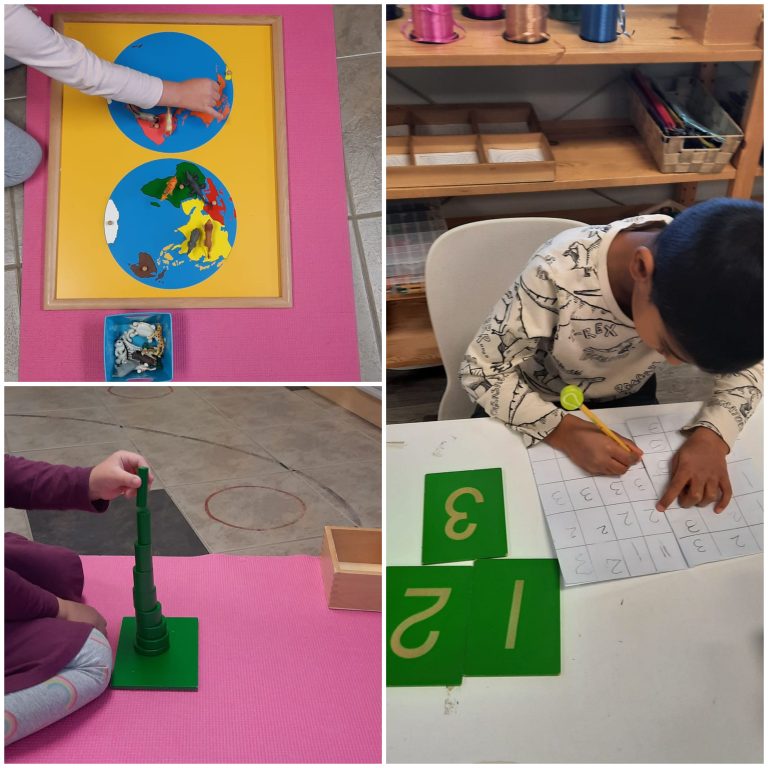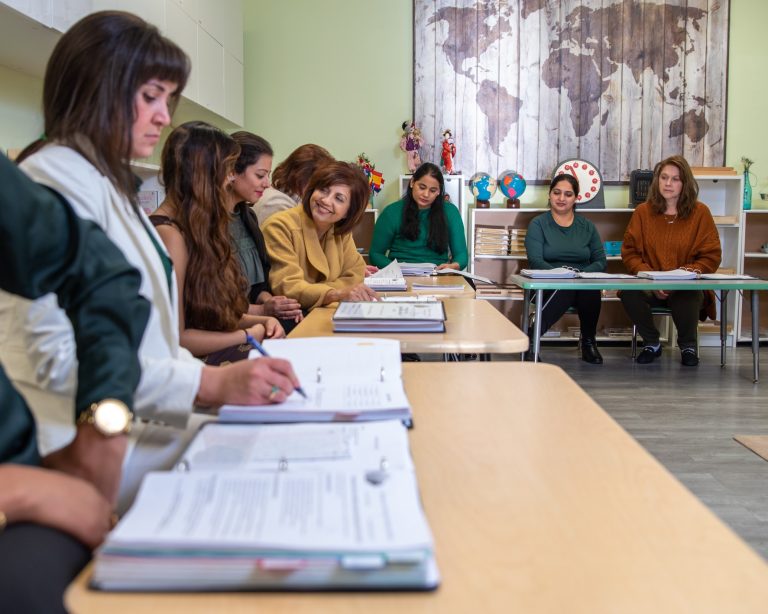5 Characteristics of a Montessori Teacher You’ll Gain through Online Montessori Training
What makes a teacher a Montessori teacher? Becoming a Montessori teacher involves more than just earning a diploma or certificate.
When you sign up for online Montessori training, you’ll discover that becoming a Montessori teacher is a deeper calling than studying pedagogy and learning about the Montessori philosophy. There are many important characteristics Montessori teachers must develop as a part of their training.
What are these characteristics and why are they so important? With the following characteristics, Montessori teachers can help the children in their classrooms reach their full potential:
1. A Prepared Spirit
According to Maria Montessori, founder of the Montessori method, teachers must prepare not only their minds but also their spirits. In The Absorbent Mind, Montessori wrote, “The training of the teacher who is to help life is something far more than a learning of ideas. It includes the training of character, it is a preparation of the spirit.”
What did she mean by that? Montessori knew that working with children requires patience, kindness, and love. Yet, Montessori also saw that it was important for teachers to truly respect children. In the Montessori classroom, children have the freedom to make choices. Children can only experience this freedom if their teachers respect them and their work.
In online Montessori training, you can work on developing your teaching persona. Each person is unique and will have their own teaching style. Yet, it’s still important to take time to consider your character, attitude, and spirit and how it might influence your teaching. The online Montessori training curriculum will cover important aspects of childhood development, how children learn, and how the Montessori classroom works which can help new teachers think through these topics.
2. A Focus on Observation
Because the Montessori method is child-centered rather than teacher-centered, Montessori teachers spend a lot of time observing. A Montessori teacher observes carefully before intervening and keeps interruptions to a minimum. Striving to guide children while respecting and encouraging their freedom, teachers also take careful notes.
Montessori teachers are often compared to servers in restaurants. While the guests are busy eating, they don’t need or want to be interrupted. In fact, if the server goes over and talks to them when they don’t need anything, it might even be annoying. However, when guests in a restaurant need their drinks refilled, it’s best when the server notices quickly and refills the drinks. The same thing is true with children in the Montessori classroom. When children are concentrating on their work, teachers shouldn’t interrupt. However, the teacher should always be watching to notice when the child needs support so that they can help.
3. Is an Excellent Role Model
Have you ever noticed that children have an uncanny way of repeating what adults say? They might even copy their parent’s mannerisms and body language. That’s because children are always watching adults and copying their behavior. Through modeling, teachers can show children important qualities in character such as respect, tolerance, and a love of learning. For example, when children see adults enjoying reading, they are more likely to enjoy reading. When teachers show respect for all students, children can also learn to show respect for their classmates.
In the classroom, teachers can also demonstrate appropriate behaviors. From putting materials away carefully to using a quiet voice and cleaning up after oneself, the teacher sets the expectations in part through their own behavior.

4. Has a Strong Understanding of the Montessori Method and Childhood Development
An excellent Montessori teacher is committed to learning as much as possible about the Montessori method and childhood development. One very important aspect is the prepared environment and the learning materials. Montessori teachers are in charge of setting up an interesting and engaging environment for children.
They must also be ready to present each of the materials and lessons to the children when they’re ready. When Montessori teachers have an intimate knowledge of the materials, it’s easy for them to notice when a child is ready for a lesson. For example, they’ll notice a child is working with the sandpaper letters over and over again every day. So, the teacher will observe and mark which letter sounds the child knows. Then, the teacher will introduce new activities such as the moveable alphabet, reading short words, forming words, and more. By knowing just what activity to introduce, the teacher helps keep the excitement of learning alive for each student.
Montessori teachers must also be knowledgeable about auto-education, sensitive periods, the absorbent mind, a child-centered approach, and more. Montessori herself spent many hours training teachers and wrote many books which are a great starting point if you’d like to learn more. You can also learn more about these topics through online Montessori training.
5. Embraces Lifelong Learning
No one knows everything and no one is perfect. A Montessori teacher accepts what she doesn’t know and takes time to continue her learning. There are many online Montessori training programs that offer opportunities for teachers to refresh their knowledge and update skills.
As Montessori herself said, “It is not enough for the teacher to love the child. She must first love and understand the universe. She must prepare herself, and truly work at it.” Understanding the universe is a tall order! Yet, through lifelong learning, everyone can continually learn.
Also important in this characteristic of Montessori teachers is the attitude. Children can ask very difficult questions. When Montessori teachers don’t know the answers, instead of being embarrassed or giving an incorrect answer, they show children how to find the right answer. As lifelong learners, Montessori teachers pass on their enthusiasm and love for learning.
A Montessori Teacher in Action
Thanks to their characteristics, Montessori teachers offer a calming, peaceful presence in the classroom. Their interactions with children are filled with joy and kindness. Through their spirits, they transmit a love and joy for learning. Children flock to the teacher and enjoy the lessons. They pick up on the teacher’s calm energy and it fills the children with the same peace.
When a Montessori teacher is skilled, it’s as if she isn’t there at all! The children work on their own. In her own words, Montessori said, “The greatest sign of success for a teacher is to be able to say, ‘The children are now working as if I did not exist. ‘”
How does this happen? Montessori teachers create a classroom in which the children can always find interesting work. They also use a variety of classroom management techniques. Once children are used to the Montessori classroom, they help each other, clean up after themselves, and more.
Although a Montessori teacher in action may not sound very busy, a lot of the work a Montessori teacher does is behind the scenes. If you step into a Montessori classroom, you might see a teacher sitting in a corner with a small group of students, presenting a lesson. Or, you might find her setting out new materials on a shelf or writing observations into a notebook. At certain times of the day, she also holds class meetings or may even host a story time. Even though she isn’t in front of the class directing the students, she’s playing an essential role in the classroom.

The Path to Becoming a Montessori Teacher
There’s no one perfect path to becoming a Montessori teacher. You don’t need a Master’s in Education to be a wonderful Montessori teacher, either. Montessori teachers come from all walks of life and may have practiced other professions before becoming teachers.
In The Absorbent Mind, Montessori wrote about several doctor friends she knew who became Montessori teachers. Many of Montessori’s first assistants were originally hired to clean the classrooms or cook. Montessori found that they quickly learned and became excellent teachers because they didn’t have to “unlearn” traditional teaching methods. Quickly, they were able to help Montessori observe students, present lessons, and help manage the classrooms.
Those who have already studied to be teachers in traditional classrooms can also become Montessori teachers. It takes some additional training to learn the unique aspects of the Montessori philosophy, how Montessori education works, and how children learn in a Montessori classroom.
Anyone who loves working with children can become a Montessori teacher. You, too can become a Montessori teacher!
Online Montessori Training Helps Teachers Acquire Important Qualities
Online Montessori training offers an excellent and convenient way for future teachers to acquire the knowledge and characteristics they’ll need in the classroom. Many online Montessori training programs are hybrid. That means they include both in-person and online portions. This gives students the convenience of being able to study theory and pedagogy from home. Yet, they also get the chance to meet in person with instructors to work hands-on with Montessori materials and experience classrooms. This results in a rich and rewarding training experience for teachers.
Online Montessori training is an ideal way for teachers to start their journey into the Montessori philosophy. Whether through an introduction, or a more intensive course, hopeful teachers and parents can gain a better understanding of the method.
The characteristics of a Montessori teacher are skills that anyone with passion and desire can learn. Are you ready to start your Montessori journey?







